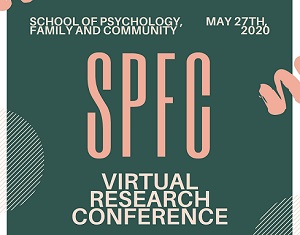Faculty Sponsor(s)
Peter Rivera, Ph.D.
Presentation Type
Event
Project Type
Research proposal
Primary Department
Marriage and Family Therapy
Description
Transgender and gender nonconforming (TGNC) people often encounter insensitive treatment in health care settings (Gessner et al, 2020). TGNC patients or clients are then more likely to avoid going to the doctor or seeking out therapy (Puckett et al, 2018). Health care professionals report a lack of education or training in how to be more sensitive (Carabez et al, 2016). This study focuses on providing the reportedly missing training to marriage and family therapists, to increase TGNC client comfort in participating in therapy. A training seminar, based on available models of TGNC sensitivity (Kort, 2018), will be provided to a number of participating therapists. Follow up by online survey, modeled after past research assessments of client comfort, will be completed by these therapist’s clients. Results aim to show that sensitivity training for therapists on TGNC sensitivity will increase TGNC client comfort in therapy.
Copyright Status
http://rightsstatements.org/vocab/InC/1.0/
Additional Rights Information
Copyright held by author(s).
Comfort in mental health treatment for transgender and gender nonconforming individuals
Transgender and gender nonconforming (TGNC) people often encounter insensitive treatment in health care settings (Gessner et al, 2020). TGNC patients or clients are then more likely to avoid going to the doctor or seeking out therapy (Puckett et al, 2018). Health care professionals report a lack of education or training in how to be more sensitive (Carabez et al, 2016). This study focuses on providing the reportedly missing training to marriage and family therapists, to increase TGNC client comfort in participating in therapy. A training seminar, based on available models of TGNC sensitivity (Kort, 2018), will be provided to a number of participating therapists. Follow up by online survey, modeled after past research assessments of client comfort, will be completed by these therapist’s clients. Results aim to show that sensitivity training for therapists on TGNC sensitivity will increase TGNC client comfort in therapy.


